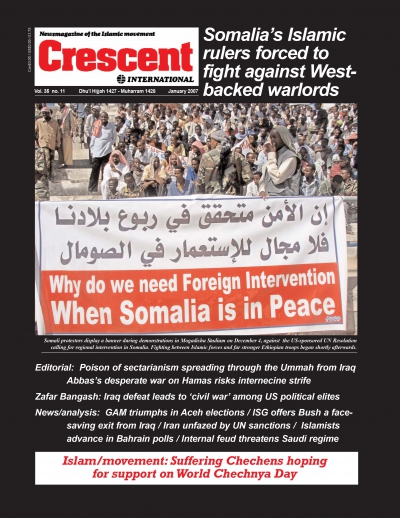Crescent International Vol. 35, No. 11
Newsmagazine of the Islamic movement
Iqbal Siddiqui
Dhu al-Hijjah, 1427 2007-01


It seems likely that Somalia will not have peace for the foreseeable future, as war again breaks out between the Islamic Courts Union (ICU) and the “interim government” (IG) with the Ethiopian forces entrenched in the region to protect it. Since it is laughable to call the handful of former warlords hiding in Baidoa an ‘interim government’, the current fighting is really only between Ethiopian troops and forces loyal to the Islamic Courts.

Painful though it is to admit it (it would be so much easier to focus on the successful resistance to the US occupation), it is undeniable that the communal strife in Iraq is resulting in a frightening increase in sectarian tensions throughout the Muslim world.

For a few tense days in December, after the attempted assassination of Hamas prime minister Ismail Haniyeh as he re-entered Ghazzah at the Rafah border crossing, apparently perpetrated by gunmen associated with the Fatah movement led by Palestinian president Mahmoud Abbas, it appeared that Palestine might slide into civil war. As so often in the past, the Palestinians drew back from the brink, knowing that the slightest slip would play into the hands of their enemies.

All over the world, the confrontation between the forces of Islam and kufr is intensifying, with the forces of the Islamic movement taking on the kuffar – represented in the modern world by the zionist-US dominated West – in many very different ways. And all over the world, we are seeing the kuffar hitting back in one very dangerous way: the promotion of sectarianism and internal discord among Muslims.

America’s defeat in Iraq is resulting in unforeseen consequences that will affect global politics in profound ways. Virtual civil wars have erupted both in Washington and in Riyadh among the hordes of Saudi “royals”. Fought only rhetorically, the war in Washington is more serious as it involves two powerful groups within the establishment: the oil lobby and the zionist lobby.

The election on December 11 of Dr Irwandi Yusuf as governor of the Indonesian province of Aceh has finally laid to rest one myth deliberately peddled by successive governments in Jakarta: that the Free Aceh Movement (GAM) is a fringe group.

It could have been an opportunity for Bahrain to set into motion a policy inspired by the Shari‘ah. But when prominent Sunni and Shi‘a Islamic groups won most of the seats in the second parliamentary elections in Bahrain in more than three decades, sectarian friction stoked the discord between the two communities. The election for the 40-member lower house ofBahrain’s Council of Representatives was marred by campaigning that brought tensions into the open.

Serious policy differences between the usually secretive members of the House of Saud have turned into a feud that is threatening to unravel the carefully constructed façade of dynastic rule maintained by bribes and terror for more than seven decades. Personal ambitions, coupled with fears that they may not survive long in power if the US flees Iraq after its defeat, have resulted in some strange public behaviour by Saudi royals.

There was uproar in Egypt last month when a small number of students at al-Azhar University, supporters of the Ikhwan al-Muslimeen, wore black uniforms and balaclavas, and performed martial arts exercises, during a protest against the university authorities. The government immediately condemned what they said was evidence that the Ikhwan has a secret military wing.

Fate seems to have thought that US president George W Bush needed more dismal assessments of his handling of Iraq after the debacle that befell the Republican party in the recent congressional elections. The report released by the Iraq Study Group on December 6 gives a catastrophic balance sheet of America’s adventurous military invasion and occupation of Iraq

According to detailed new research by American economists based on 50 years of data, the US uses its aid budget to bribe countries that are on the security council to secure their votes in its favour. The cash on offer increases by almost 60 percent when recipients of US bounty become members of the council

In what may be one of the UN’s most hypocritical moves ever, the Security Council imposed nonmilitary sanctions on Iran on December 23 for its peaceful nuclear-power programme. That the resolution went through several drafts over the course of two months reflected deep divisions among Council members, but its final passage reconfirmed that the UN does not live up to its high-sounding principles or care about the rights of others

Although the recent assassinations of Anna Politkovskaya and Alexander Litvinenko have failed to draw international condemnation for Russian prime minister Victor Putin, they ought to draw attention to the continuing war in Chechnya. HAJIRA QURESHI of the SCC looks forward to World Chechnya Day.

Throughout history, Arab rulers have repeatedly betrayed the interests of the Ummah by aligning themselves with the enemies of Islam. Since the division of the Middle East into nation-states by the West at the turn of the last century and the installation of tribal chiefs as rulers, these rulers have done everything to undermine the Ummah. From aligning themselves with Britain to destroy the Uthmaniyyah khilafah to facilitating the implantation of Israel in Palestine, and more recently supporting the Western-backed Iraqi invasion of Islamic Iran (1980) and then joining the West’s onslaught on Iraq in 1991, they have never failed to indulge in treachery
